Read this article in French German Italian Portuguese Spanish
Zeppelin Rental: Driving the energy transition
26 September 2024
Peter Schrader, managing director and COO of Zeppelin Rental, discusses how the company is driving the energy transition, its use of technology and market trends in Europe. Lewis Tyler reports.
Earlier this year Zeppelin Rental unveiled ecoSolutions, a new brand for its expanding range of green products and services.
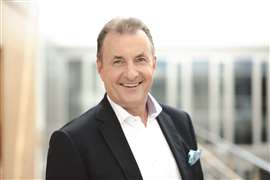 Zeppelin Rental COO Peter Schrader says the launch of ecoSolutions represents the company's latest commitment in leading the energy transition for the rental industry. (Photo: Andreas Gebert/Zeppelin Rental)
Zeppelin Rental COO Peter Schrader says the launch of ecoSolutions represents the company's latest commitment in leading the energy transition for the rental industry. (Photo: Andreas Gebert/Zeppelin Rental)
With the launch of the brand, the Germany-based company, a subsidiary of the Zeppelin Group, is making its entire range of climate-friendly, energy-efficient services available, including the hydrotreated vegetable oils (HVO) supply for rental machines, smart supply and disposal logistics and digital traffic solutions.
The company said the launch provides a “perfect and innovative answer” to increasing demand for sustainable solutions in construction and means its customers can find everything they need for projects in one place.
Speaking to IRN on a recent video call, managing director and COO Peter Schrader says the move represents its latest commitment in leading the energy transition of the rental industry.
According to Schrader, who has held the role of managing director for 20 years, the company was one of the early drivers for sustainable solutions.
“Many companies did the same later,” he tells IRN. “If you look back to 2011, we introduced the ecoRent sign to offer the best machines with the lowest emissions in our markets. It was driven by me from the idea to put something new in the market and to show our customers the best equipment with the lowest emissions for their demands and their needs.
“With our new activities for sustainability and digitisation you have to invest a lot at first and you need somebody on the other side who is able or willing to pay for that. We were convinced that it is necessary to keep going in this direction and so we have this vision to be a leader in the green transformation.
“And so, we combined not only the products, but also the additional services to create a new eco solutions brand.”
Down to demand
Much of the services available under the new brand are already part of the Zeppelin portfolio, but the company plans to add more solutions in the future to “complete the sustainable offering.”
It said that through ecoSolutions, each service on offer can be combined to the requirements of a customers project, offering greener solutions and further developing in the areas of sustainability and
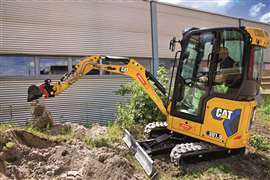 The company says demand for machines and equipment with alternative drives, such as the new electric mini excavator CAT 301.9 E, is rising steadily. (Photo: Jörg Eberl/action press)
The company says demand for machines and equipment with alternative drives, such as the new electric mini excavator CAT 301.9 E, is rising steadily. (Photo: Jörg Eberl/action press)
environmental protection.
“It’s a permanent process,” Schrader says when asked what stage the company is at in supporting the energy transition and whether cost compared to conventional models is still an issue to overcome.
The view of the company is that demand for green solutions has increased, and will continue to do so in the future, but it needs to be a collaborative approach across key stakeholders in the value chain.
“We can only be successful together with the customer and the suppliers if companies build the product so that we can find better solutions and have lower prices,” says Schrader.
He adds that cost isn’t the only issue; “The hypothesis is that it’s still an issue, but it depends a little bit on the political circumstances, the processes and the project. Is there demand for green solutions in the project that the customer has to follow? It’s a mixture of everything.
“If he hasn’t, nobody is open to or wants to pay for that. So (the customer) says, ‘OK, we will use the cheap equipment’.”
He says the company wants to continue its investment in greener products as part of its long-term strategy, but admits it will “have to look at what does the customer demand.”
“For example, we offer the first electric skid-steer loaders, we offer electrical hand tools, we invested in electrical wheel loaders and now in mini excavators from Caterpillar. So, it’s an ongoing process, but if you look also in the car industry at the moment, there’s a lot of discussions. There’s a mixture and we have to handle it with a lot of responsibility.”
New technologies
Another trend in the equipment rental and wider construction industries is the integration of new technologies such as Big Data, Machine Learning, Artificial Intelligence (AI) and Building Information Modeling (BIM).
There are a number of notable examples of companies utilising the above, and Zeppelin is no exception.
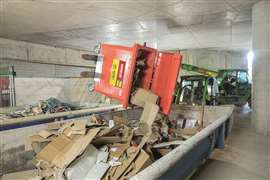 An efficient waste management to ensure high recycling rates is one of Zeppelin Rental’s services that belongs to the ecoSolution brand. (Photo: x21de – Reiner Freese)
An efficient waste management to ensure high recycling rates is one of Zeppelin Rental’s services that belongs to the ecoSolution brand. (Photo: x21de – Reiner Freese)
Take, for example, its Rental+app (also available via ecoSolutions), which launched in 2022 and see’s the company liaise with customers working on construction projects to decide what equipment they are likely to need to hire.
Moving into the AI space is something that the company is interested in, and Schrader says it is already working on something; “We have been working on this topic for a year and have been doing some work even before the ERA Convention.
“We believe that AI will support and make us more efficient in many areas. For example, to apply to customers market-oriented topics and also in some processes but in the end it’s one part of our developments and projects we are working on, and we have to be handle it carefully, but we are convinced that it will be a future tool for our demands.”
He says that similar to the adoption of alternative-power, the key to AI adoption is customer demand; “It’s more or less driven for customer support so that they are more successful and have more advantages for internal processes, but that’s in the very early stages.
“There are so many different things (AI can be used for). Chat boards for maintenance to avoid downtime, optimised machine maintenance and support. There’s a lot of things and we have to find the solutions that work.”
Market trends
Zeppelin Rental is of course active across a number of markets outside of its native Germany, including Austria, Czech Republic, Denmark, Slovakia and Sweden.
Despite what Schrader describes as “a difficult situation” for the construction industry in Europe, Zeppelin Rental posted revenues of €738 million for the 2023 financial year (up from €666 million in 2022).
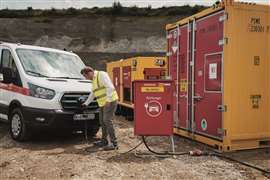 With its ecoRent-program and its new sustainability brand ecoSolutions, Zeppelin Rental says it has “always been a pioneer in offering green solutions and services.” (Photo: Arne Nagel/Zeppelin Rental)
With its ecoRent-program and its new sustainability brand ecoSolutions, Zeppelin Rental says it has “always been a pioneer in offering green solutions and services.” (Photo: Arne Nagel/Zeppelin Rental)
He says the outlook for Zeppelin Rental in Germany is stable, with strong demand across its equipment and our services segment.
However, recent high investment in equipment from customers means there is demand but it is “decreasing demand.”
It is also being impacted by the weak housing market in Germany, he says, “The housing construction market, especially in Germany, is in a very bad situation, but overall, we have a contradiction.
“On one hand we are working very intensively on highly relevant topics such as digitalization, sustainability and the transformation of the construction industry.
“On the other hand, these efforts and activities are difficult and expensive to implement and we have constantly rising costs and they are not reflected in construction prices and on rental rates. Very often the customers are interested in what we can offer them but on the other side they are not willing to pay more.”
Infrastructure spending is also proving problematic, with high demand being held up by approval processes.
“This demand and the investment could be a driver in the economical growth in Germany, but it doesn’t work at the moment,” Schrader says. “It’s driven from the political and economical environment and the circumstances which we have in Europe, Germany and the rest of the world.”
In its operations in Austria, he says the construction industry is weak which is having an impact on rental demand. In the Czech and Slovakia regions the outlook is more positive, he says, but the construction market in Denmark and Sweden are also seeing downturns.
Looking back at Germany, one boost for the economy will of course be the Bauma exhibition in Munich, which returns to its normal April slot in 2025 following the pandemic-hit 2022 edition.
Zeppelin, and indeed Schrader, have long history with the show. Next April will be his 12th time at the show; “I love Bauma and I’m absolutely convinced that we can offer our customers and everybody something interesting.”
He says the next edition will be “a little bit different to the last Bauma,” with the company returning to its familiar outside spot.
“At the moment we are working on that and also on the projects that we want to present to the customer. I think it will be very interesting for everybody to visit.”
Looking back, planning ahead
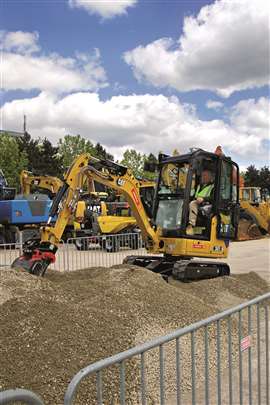 The company offers the 301.9 mini excavator from Caterpillar. (Photo: Zeppelin Rental)
The company offers the 301.9 mini excavator from Caterpillar. (Photo: Zeppelin Rental)
Schrader, who’s contract with the company runs until 2026, first joined the company some 34 years ago, before the Zeppelin Group had a dedicated rental division.
In 2004, when it acquired MVS AG in Germany, the company became MVS Zeppelin. Then, in 2012, the division was rebranded as Zeppelin Rental.
The company said that since the merger it has “continuously diversified as a result of the acquisition of various companies in the areas of construction site and traffic safety as well as construction logistics.”
Looking back on the developments in the last 20 years, Schrader notes some of the changes in the industry and growth within the company.
He says, “With this acquisition and merger (of MVS) we were the number one in Germany in rental. We had more than 120 rental stores and a fleet of 33,000 machines and different devices.
“Today, our fleet has more than 75,000 machines and equipment and we have added many different services. What we have now is a big, stable pillar in the Zeppelin enterprise world. The market leader in Germany, but also with international output.”
On changes to the rental market, he adds, “In the 90s rental was only a small part of business behavior. It was necessary for periods of high demand and now it’s a part of yearly business and strategic decisions.
“I’m absolutely convinced that rental is one of the business models for the future. It’s part of the sustainability model.”
As for further acquisitions, he says the company is open to additions to its portfolio and is “constantly scanning” markets for opportunities, but the priority at the time of writing is to “focus on doing our homework on our last acquisitions.”
He says, “The last large acquisition was CP in Denmark and there is a lot of work to do there and in Scandinavia. Also in Germany with all the different services and solutions that we have.
“Under the current situation, in 2024 and 2025, we have to do a lot, but if there’s something on the table, we have to check it and to look.”
Looking to his own future with the company, one of his goals is to “create a modern rental company, ready the challenges for the next 10 years.”
High on the agenda will likely be the energy transition and utilization of AI. As far as the potential of an extension to his contract is concerned, he tells IRN that discussions are underway. Watch this space…
STAY CONNECTED



Receive the information you need when you need it through our world-leading magazines, newsletters and daily briefings.
CONNECT WITH THE TEAM









